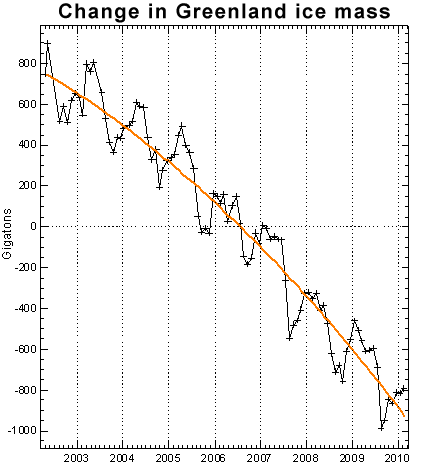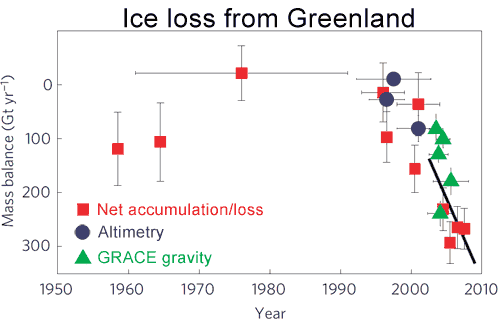Latest GRACE data on Greenland ice mass
Posted on 28 May 2010 by John Cook
I don't plan to fall into the trap of breathlessly reporting every twist and turn of short-term climate fluctuations (I went through a bit of a silly period in March and April 2008). But we've been discussing Greenland trends and as it's been over a year since posting GRACE data on Greenland ice mass so I figure we're due an update. Many thanks to Tenney Naumer of Climate Change: The Next Generation who emailed me the graph. Thanks also to John Wahr at the University of Colorado who analysed the GRACE data and granted permission to reproduce it here. Figure 1 below shows the latest satellite gravity measurements of the Greenland ice mass, through to February 2010

Figure 1: Greenland ice mass anomaly (black). Orange line is quadratic fit (John Wahr).
This graph includes 12 months more data than Velicogna 2009 and shows the rate of ice mass loss is still increasing. Of course, this is only over an 8 year period. You get a broader picture when you combine GRACE data with other estimates of Greenland mass balance. Figure 2 combines altimetry, net accumulation/loss, GRACE gravity data. It doesn't include GPS measurement although this is consistent with other results, also showing acceleration in recent years.

Figure 2: Rate of ice loss from Greenland. Vertical lines indicate uncertainty, horizontal lines indicate averaging time. Blue circles are from altimetry, red squares are from net accumulation/loss and green triangles are from GRACE. The black line is a straight-line (constant acceleration) fit through the mass balance data for the period 1996–2008 with a slope of 21 gigatonnes/yr2 (Jiang 2010).
What we find is over a longer time period, Greenland was in approximate mass balance in the early 1990s. Before then, data is sparse but may have been slightly increasing in mass during the mid-20th century.































 Arguments
Arguments































Those IPCC predictions are for sea level rise by 2100. If you look at sea level prediction graphs, you'll note that sea levels are still rising sharply at that point. While you or I will probably not see beyond 2100, our grandchildren probably will. So there will be significant sea level rise beyond 2100 - it's just that the IPCC predictions don't go any further (to my knowledge). The timeframe of Kopp's 6 metre sea level rise is uncertain although other work indicates a timeframe of several centuries.
"Why aren’t sea levels already much higher and rising faster than they are today? After all, it’s already warmed by at least .75c since 1900 that’s almost a third of the way there to 6 metre increases in sea level"
The ice sheets have a great inertia - it takes a while for them to respond to the warming temperatures. In that sense, their great inertia is our friend. However, once they start disintegrating, it's not like we can throw a rope around the ice sheets and hold them back. At that point, the inertia becomes our enemy.
The main uncertainty to be resolved is time frame. The latest research indicates roughly 1 to 2 metres sea level rise by 2100 but it's difficult to say how quickly sea level rise will evolve after that. However, this uncertainty does not serve as a basis for inaction - quite the contrary.
I don't get this sense in the peer-reviewed literature. The concern for collapse of Greenland's ice sheet comes from the fact that when the Earth was 1 to 2 degrees warmer than now, sea levels were at least 6 metres higher than now. These higher sea level weren't because temperatures changed quickly during the last interglacial 125,000 years ago but due to sustained warmer temperatures.
Greenland didn't disappear 100,000 years ago - it's been around for at least half a million years. Using very rough back-of-the-napkin calculations, 6 metres sea level rise would receive perhaps 3 metres sea level rise from Greenland which would be less than half of the ice mass currently on the ice sheet. This is very roughly speaking, I'm not aware of the relative contributions from Antarctica versus Greenland.
The issue here isn't the total disintegration of Greenland (at least I hope it doesn't come to that). But even a partial collapse of the Greenland ice sheet will impose sea level rise in the order of metres plus a corresponding sea level rise from Antarctica (throw in melting glaciers and thermal expansion for good measure).
I also mentioned that’s strawman. But now that you bring it up: There was a post on this site that suggested if these trends not only continued on this very short slope but accelerate exponential then Greenland’s icecap will be gone in 65 years! To be fair the post mentioned that was unlikely, but still thought the possibility was worth a mention. However, the post has been modified over the weekend. Down the memory hole! Anyway, that’s where I got the idea that someone here might possibly believe in the imminent failure of Greenland’s icecap....within our children's lifetime! Silly me.
BTW, I can always tell when someone grabs pics from my site by the telltale bolded, Arial heading added above the graph :-)